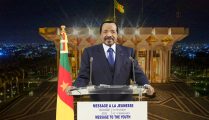Privacy Overview
This website uses cookies so that we can provide you with the best user experience possible. Cookie information is stored in your browser and performs functions such as recognising you when you return to our website and helping our team to understand which sections of the website you find most interesting and useful.


















29, December 2019
An Islamic State Christmas killing of 11 hostages in Nigeria threatens to flare up religious tensions 0
A video released by Islamic State on Dec. 26 which claims to show the killing of 11 Christian hostages in northern Nigeria threatens to spark religious tensions in the country and compounds the political problems of president Muhammadu Buhari.
The Islamic State sub-group called Islamic State West Africa Province (ISWAP) said the “beheading” of the hostages was part of its campaign to “avenge” the killing of IS leader Abu Bakr al-Baghdadi in a US military raid in Syria last October.
ISWAP is a 2016 breakaway faction of the Nigeria-founded Boko Haram terrorist group. Until last year when more radical leaders took over, ISWAP was led by Abu Mus’ab al-Barnawi, the son of Boko Haram’s founder, Mohammed Yusuf. As well as Nigeria, it operates in Cameroon, Chad, Niger and Mali, all of which are Nigeria’s neighboring countries. In December, the group killed four aid workers from the NGO Action Against Hunger who they originally abducted in Damasak in Nigeria’s northeastern Borno state in July.
In a bid to ward off talk of religious disputes getting widespread, president Buhari said Nigerians shouldn’t allow terrorists split the populace along religious lines. “We should, under no circumstance, let the terrorists divide us by turning Christians against Muslims because these barbaric killers don’t represent Islam and millions of other law-abiding Muslims around the world,” he said in a statement.
Nigeria, whose 200 million-strong population is split almost evenly between Christians and Muslims, is particularly sensitive to the risks of religious tensions being ignited after decades of on-and-off conflict especially in the country’s middle belt region over the last couple of decades. Most recently the region has been subject to vicious clashes between migratory herdsmen and local farmers primarily over land use. As the herdsmen are often Muslim and landowners widely believed to be Christian, these clashes are regularly perceived as religious clashes.
Islamic State’s release of the video came days after the United States government accused Nigeria of not protecting religious freedom. The US State Department on Dec. 18 added Cuba, Nicaragua, Nigeria, and Sudan on a Special Watch List (SWL) of governments that “have engaged on or tolerated severe violations of religious freedom.”
Nigeria and the other three countries now join Comoros, Russia and Uzbekistan on the list. The designation was a triumph of American Christian right groups that have been lobbying the Trump’s administration to appease its evangelical base by taking up the fight of Christians across the globe.
Earlier, Nigeria’s information minister Lai Mohammed rejected Nigeria’s new designation and argued the Trump administration was acting on the basis of a discredited narrative from “failed politicians and disgruntled elements.”
“The deliberate effort to give religious colouration to the farmers-herders clashes and the Boko Haram insurgency, in particular, has undoubtedly helped to mislead the US into concluding that the government is doing little or nothing to guarantee religious freedom in the country,” said Mohammed.
The video of ISWAP killing of Christians says otherwise. In fact, it reinforced what some Nigerian Christian leaders have previously claimed—that the government of Buhari had not done enough to curtail the activities of various Islamic terrorist groups operating in Nigeria.
In his reaction to the US designation of Nigeria amongst countries on SWL, the president of the Christian Association of Nigeria (CAN), Samson Ayokunle warned “discrimination against Christians can result in another civil war which Nigeria may not survive.” Through a spokesman CAN’s president pointed to killings of Christians in states in the middle-belt region as atrocities that could not have gone unnoticed by the United States. The Christian group alleges that while Muslims have also been killed, the primary targets were Christians.
After initially receiving plaudits for pushing back against the peak of Boko Haram’s rise in Nigeria’s northeast, Buhari’s government, which came to office in 2015, has been more recently criticized over its weak handling of Islamic insurgency, broader conflict and rising insecurity across the country.
As a result of continuing insecurity in Nigeria’s northeast, conservative Christian groups including Washington DC-based Save the Persecuted Christians (STPC) have seized on the killings to urge the Trump administration to appoint a US special envoy to Nigeria and the Lake Chad region to monitor what it called “heightened violence against Christians.”
In conservative media across America, there are barrage of stories emerging about the persecution of Christians in Nigeria. The Christian Post reported Boko Haram and Fulani herdsmen have killed over 1,000 Christians in Nigeria in 2019 alone. A separate figure by put the estimated number of dead Nigerians in 10 years of the insurgency as 27,000.
The break away of ISWAP is widely believed to have brought about a change in direction for the Islamic insurgency. What started in 2009 as an indiscriminate campaign of terror against Muslims and Christians alike has in recent times seemed more targeted. From the 2018 kidnapping in Dapchi schoolgirls in Yobe state and the release of the girls with the exception of Leah Sharibu, a Christian, the insurgence seems to have taken a turn to primarily targeting Christians.
Source: Quartz Africa